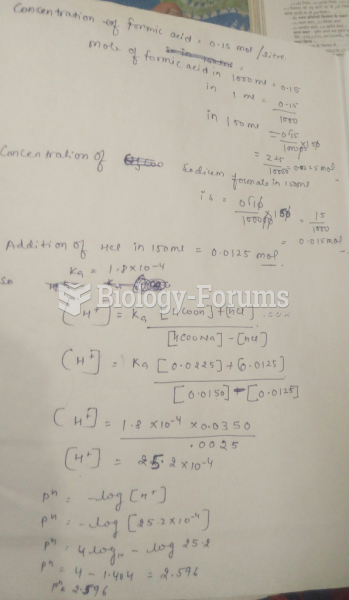Answer to Question 1
1,2,3
Rationale 1: Allergic reactions to amino acids are not uncommon.
Rationale 2: Irregular heartbeat may occur in response to this therapy.
Rationale 3: Neurological effects of amino acid therapy include drowsiness, dizziness, and problems with coordination.
Rationale 4: Decreased weight gain may occur but is not likely to be a direct result of amino acid therapy.
Rationale 5: There is no evidence that amino acid therapy results in failure to thrive.
Global Rationale: Allergic reactions to amino acids are not uncommon. Irregular heartbeat may occur in response to this therapy. Neurological effects of amino acid therapy include drowsiness, dizziness, and problems with coordination. Decreased weight gain may occur but is not likely to be a direct result of amino acid therapy. There is no evidence that amino acid therapy results in failure to thrive.
Answer to Question 2
1
Rationale 1: It is essential to recognize the difference between angina and myocardial infarction because the treatments are very different. Chest pain that is relieved by one sublingual nitroglycerin is most likely angina. Chest pain that is not relieved by nitroglycerin would most likely be from a myocardial infarction.
Rationale 2: Chest pain that is radiating can be from angina or a myocardial infarction.
Rationale 3: Chest pain related to angina is often experienced when the person is doing a strenuous activity. Eating is not strenuous.
Rationale 4: Chest pain that is accompanied by shortness of breath can be from angina or a myocardial infarction.
Global Rationale: It is essential to recognize the difference between angina and myocardial infarction because the treatments are very different. Chest pain that is relieved by one sublingual nitroglycerin is most likely angina. Chest pain that is not relieved by nitroglycerin would most likely be from a myocardial infarction. Chest pain related to angina is often experienced when the person is doing a strenuous activity. Eating is not strenuous. Chest pain that is radiating or is accompanied by shortness of breath can be from angina or a myocardial infarction.







